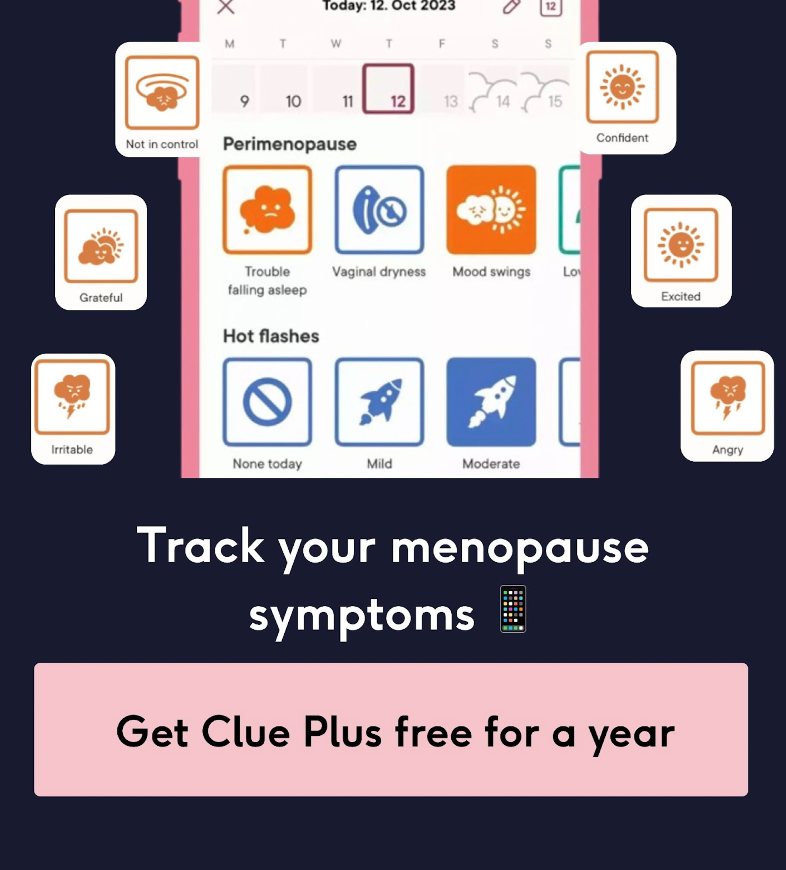
Can the contraceptive pill treat perimenopause
Disclaimer: This article is sponsored by Clue, but just like all of our other content, this is a completely honest breakdown. See our Content Policy for more details.
In this article
What's the lowdown?
The combined pill can be used to treat perimenopause symptoms
You can track your symptoms using Clue’s ’perimenopause mode’ and take control of your journey
The progestogen only pill may help perimenopause symptoms in some, and is occasionally used as part of HRT
Other contraceptives like the hormonal coil can be used in perimenopause as part of HRT and/or to treat bleeding symptoms
You still need to use contraception to prevent pregnancy during perimenopause!
As perimenopause usually starts in your mid 40s, people are often still using contraception – but can the contraception actually help with symptoms? Well, yes it can!
Do I still need to use contraception in perimenopause?
Yes, you still need to use birth control in perimenopause. If you are under the age of 50, you are considered to be fertile until 2 years after your last period. If you are over 50, you are considered to be fertile for 1 year after your periods have finished. Sure, it might be very very unlikely you get pregnant, but we still need to be sure!
If you’re using contraception which has stopped your periods (for example, the hormonal coil, injection, implant or progestogen only pill), you can safely stop it after the age of 55.
We have loads more information specifically about contraception in the menopause in our health hub article.
How do I know if I’m in perimenopause if I’m using contraception?
One of the first perimenopausal symptoms women experience is changes to your periods. But hormonal contraception can regulate or even stop your periods – so how are you meant to know when perimenopause has started?
Recording your symptoms and how they change over time is an excellent way to recognise perimenopause. Standard menstrual cycle tracking apps often only focus on your reproductive or fertile years, but now, Clue offers a perimenopause mode with Clue Plus! Clue Perimenopause allows you to record perimenopausal symptoms such as hot flushes, vaginal dryness, mood and sleep changes in a dedicated mode designed to help you navigate the changes that come with perimenopause. This can help identify where you are in your perimenopause journey, even while using contraception.
Can the contraceptive pill treat perimenopause symptoms?
Yes! The contraceptive pill can treat perimenopause symptoms. It can be difficult to know when the perimenopause starts, but tracking is one of the best ways to notice the initial symptoms.
The combined contraceptive pill contains oestrogen. Perimenopause symptoms are caused by your body’s oestrogen levels fluctuating and falling, so by taking a consistent daily amount, this may help manage your symptoms. Combined contraception can also help manage the period symptoms of perimenopause by making bleeds lighter, shorter and more predictable.
However, most combined contraceptive pills contain synthetic oestrogen, rather than the natural, body identical oestrogen in hormone replacement therapy (HRT). Synthetic oestrogen isn’t as good as HRT at providing bone protection to prevent osteoporosis. Combined hormonal contraception also may not be suitable for those with risk factors in their medical history and has to be stopped by the age of 50.
Which pill is best to treat perimenopause symptoms?
The best pill to treat perimenopause symptoms is whichever pill is safest and causes the fewest side effects, because then you’re more likely to take it! If the standard combined pills such as Rigevidon and Microgynon are working for you….then why change?
However, as the standard pills contain synthetic oestrogen, they may not be the best choice for everyone in perimenopause. Some of the new combined pills such as Qlaira and Zoely contain a different form of oestrogen called estradiol which is identical to the one our bodies make – so called “body identical” oestrogen. This is the same type of oestrogen that’s found in HRT so could be better for perimenopausal symptoms. Qlaira is a pill that changes hormone levels throughout the month, whereas Zoely has the same level of hormones in each pill. They are both combined with different progestogens, so you may need to try these to see which suits you and your symptoms best.
How long can I take the pill for during perimenopause?
You can take the combined contraceptive pill until the age of 50. This is because beyond 50, the health risks of the combined pill such as the risk of a blood clot or stroke start to become greater. These risks are very small when you’re younger, but balanced against the risk of pregnancy (which is very unlikely over 50), these risks become slightly more significant.
Don’t worry, you can change to an alternative form of contraception until you can stop at the age of 55. And for perimenopausal symptoms, there are a whole range of other ways to manage them, including lifestyle changes, supplements and HRT.
Can any other contraceptives treat menopause?
Yes, other contraceptives are used to treat menopause, but usually not alone.
The desogestrel progestogen only pill (think Cerelle, Cerazette) can be used at a double dose (two tablets) as the progesterone part of HRT. An older type of progestogen only contraceptive called Noriday at a triple dose (3 tablets) has occasionally been used as part of HRT during times of drug shortages. However, these are off license and should only be used on the advice of a menopause specialist.
The hormonal coils Mirena, Levosert and Benilexa which provide contraception can also be used as the progesterone part of HRT for up to 5 years, and they are a fabulous treatment for heavy bleeding that can come with perimenopause.
If you need support in choosing the right contraception, our comparison tool and contraception recommender are right on hand. And don’t forget we have a fantastic team of doctors who are all brilliant at managing both contraception and perimenopause, alongside our partner menopause specialists.
Our medical review process
This article has been medically reviewed for factual and up to date information by a Lowdown doctor.








